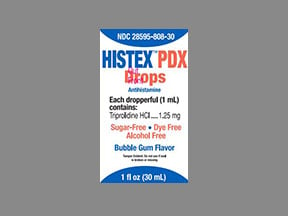
Histex Pdx Coupons & Savings Card – Discount Prices from $108.74
My prescription
Edit
30ML of 1.25MG/ML, Histex Pdx (1 Bottle)
Select pharmacy

Albertsons
$108.74
COUPON PRICE
Walgreens
$108.74
COUPON PRICEHistex Pdx savings card
Show this card to your pharmacist
Albertsons
$108.74
BIN
ID
PCN
GRP
011867
LH918A5E92
HT
LABH001
Powered by
Price history for Histex Pdx
1 Bottle, 30ML of 1.25MG/ML
Average retail price for Histex Pdx
Average SaveHealth price for Histex Pdx
Our price history data is based on aggregated prescription data collected from participating pharmacies in America. Our prescription data updates daily to reflect the latest price changes. If you notice a missing data point, it means there wasn't sufficient data available to generate a monetary value for that date.
*Retail prices are based on pharmacy claims data, and may not be accurate when we don't have enough claims.
Histex Pdx dosage forms
Dosage Quantity Price from Per unit 30ML of 1.25MG/ML 1 Bottle $110.12 $110.12 30ML of 1.25MG/ML 2 Bottles $218.23 $109.11 30ML of 1.25MG/ML 3 Bottles $326.35 $108.78
| Dosage | Quantity | Price from | Per unit |
|---|---|---|---|
| 30ML of 1.25MG/ML | 1 Bottle | $110.12 | $110.12 |
| 30ML of 1.25MG/ML | 2 Bottles | $218.23 | $109.11 |
| 30ML of 1.25MG/ML | 3 Bottles | $326.35 | $108.78 |
Histex Pdx Warnings
It is important to exercise caution when using this medication. Below are key safety and warning details to consider:
Avoid Concurrent Use with Topical Antihistamines: Do not apply antihistamines on the skin (e.g., diphenhydramine cream, ointment, spray) while using this medication, as it may heighten side effects.
Drug Interactions: Inform your doctor or pharmacist if you are using other substances that can cause drowsiness. These include:
- Opioid pain or cough medications (e.g., codeine, hydrocodone)
- Alcohol
- Marijuana (cannabis)
- Medications for sleep or anxiety (e.g., alprazolam, lorazepam, zolpidem)
- Muscle relaxants (e.g., carisoprodol, cyclobenzaprine)
- Other antihistamines (e.g., cetirizine, diphenhydramine)
Medication Label Awareness: Carefully read the labels of all your medications, including over-the-counter allergy or cough-and-cold products, as they may contain ingredients that can cause drowsiness. Consult with your pharmacist to ensure safe use of these products.
Interference with Laboratory Tests: This medication may affect the results of certain lab tests, such as allergy skin tests, potentially leading to false results. Ensure that all healthcare professionals and lab personnel are aware of your use of this medication.
Adhering to these guidelines will help ensure the safe and effective use of your medication.
Histex Pdx Side Effects
When taking this medication, you may experience some common side effects such as drowsiness, dizziness, headache, nausea, vomiting, loss of appetite, constipation, stomach discomfort, blurred vision, decreased coordination, or dryness in the mouth, nose, or throat. These effects typically lessen as your body gets used to the medication. If they persist or worsen, it is important to consult your healthcare provider promptly. To minimize dizziness or lightheadedness, rise slowly from sitting or lying down positions. For dry mouth relief, consider sucking on sugarless candy or ice chips, chewing sugarless gum, drinking water, or using a saliva substitute. Triprolidine may also cause mucus in the lungs to become thicker and more difficult to clear, potentially affecting breathing. Drinking plenty of fluids can help mitigate this effect, unless advised otherwise by your healthcare provider. Serious side effects, although uncommon, should be reported immediately to your healthcare provider. These include mental or mood changes like hallucinations or irritability, ringing in the ears, difficulty urinating, easy bruising or bleeding, irregular heartbeat, and seizures. Severe allergic reactions to this medication are rare but require urgent medical attention if symptoms such as rash, itching, swelling (particularly of the face, tongue, or throat), severe dizziness, or trouble breathing occur. This list does not cover all possible side effects, so if you notice any other unusual symptoms, contact your healthcare provider for advice.
Histex Pdx Interactions
Is Histex non-drowsy?
Histex is an antihistamine that can cause drowsiness as a side effect. It is not specifically formulated to be non-drowsy. If a non-drowsy antihistamine is needed, it is advisable to consider alternatives like loratadine or cetirizine, which are less likely to cause drowsiness. It is always best to consult with a healthcare provider for personalized advice.
Using the SaveHealth discount card, what is the price of Histex Pdx without insurance?
Using the SaveHealth discount card, the price of Histex Pdx without insurance is $108.74.
What is the price of Histex Pdx at Walgreens?
The price of Histex Pdx at Walgreens is $108.74.
